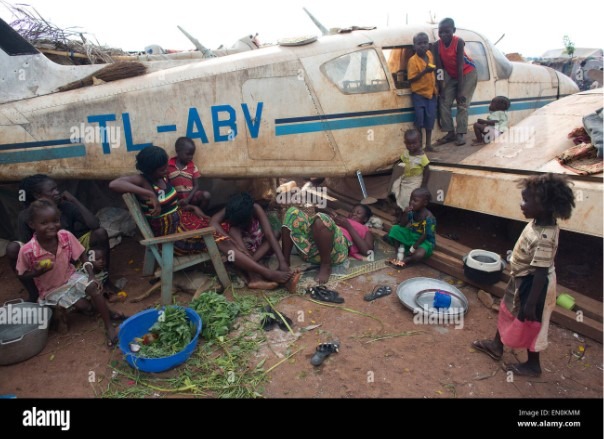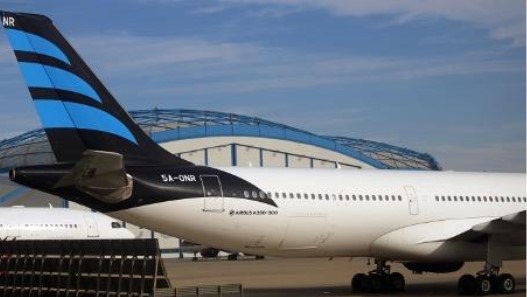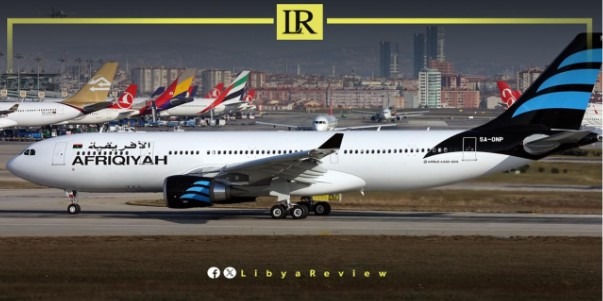Afriqiyah Airways : Ready for a New Takeoff ?

Executive Summary
Colonel Muammar Gadhafi succeeded to build up a powerful aerial network linking Europe to Africa. The airline connected Tripoli, its main hub, to key destinations worldwide. Popular destinations span Europe, including London and Paris, supporting both corporate and leisure travel. Within Africa, the airline serves major cities such as Accra and Lagos, facilitating regional trade and tourism. Just before President Sarkozy declared total war against Libya, servicemen from the French Intelligence Company DGSE used to fly with Afriqiyah Airways to join their favorite base in Bangui. It was less expansive than Air France and the flights were more frequent. The airplanes were bought from the European Consortium Airbus of whom the headquarter is Toulouse in France.
Sommaire
Today, Afriqiyah Airways is facing a turmoil after years of mismanagement and corruption. State owned and operated Libyan institutions have a long legacy of service failure and financial loss. The CEO was fired in 2018. The Attorney General reported in February 2025 that its Deputy Public Prosecutor has detained, pending further investigation, the Managers of Afriqiyah Airways and Libyan Airlines, as well as eight others in their respective Airworthiness Continuity, Technical Affairs, Air Safety, and Compliance Monitoring Departments . The investigator inferred that the will of the managers of the two companies tended to violate the civil aviation safety regulations by deliberately operating flight that do not meet the safety conditions and standards, which endangered the lives of passengers.
Just before, in 2024 December, the Tripoli based Libyan Prime Minister, Abd Alhamid Aldabaiba, followed up on the launch of a new airline aimed at addressing the current airline situation. The meeting was attended by Minister of Transport Mohamed Al-Shahoubi, Minister of State for Communication and Political Affairs Walid Al-Lafi, Chairman of the Executive Team for President’s Initiatives and Strategic Projects Mustafa Al-Mana, and Chairman of Afriqiyah Airways Ahmed Al-Amin. During the meeting, it was stressed that the launch of the new company comes within the framework of an advanced investment vision aimed at improving the competitiveness of the sector at the global level, in line with the government’s plan to develop airports in different cities.

Refugees camp surrounding Bangui Mpoko airport from 2013 civil war
The report notably mentioned that the Chairman of the state Afriqiyah Airways was present – but neither the Libyan Airlines nor the chairman of the Libyan African Aviation Holding Company (LAAHCO), were present. The state Holding Company owns both the state Afriqiyah Airways and Libyan Airlines.
The Libyan state has billions of assets still frozen by UN Security Council sanction, struggles to pay state-sector salaries every month on time and there is still a bank liquidity crisis. The EU flight ban on Libyan registered carriers is still in place and most western nations advise their citizens not to travel to Libya. Half of Libya is run by military strongman Khalifa Haftar and the country has failed to agree on a constitution and hold elections for a unified government that would rule the whole country.
Both the two current state carriers, Afriqiyah and Libyan Airlines are struggling. The still-in place EU flight ban and the damage both carriers suffered to their aircraft during the 17 February revolution have added to their woes. Both carriers suffer from over-employment, with Libyan Airlines the worse of the two. They are both in debt and struggle to pay salaries. Many Libyan Airlines have not been paid for a year.
Before any involvement in assets recuperation or new aircrafts acquisition it seems imperious to audit the present company situation and to build up with competent investors a strategic business plan.
A Trans African Airlines System ?
The airlines have been in negotiations over a merger for several years, but the plan has been repeatedly delayed, most notably by the overthrow of Libya’s Muammar Gadhafi in 2011. Gadhafi and his regime founded Afriqiyah as a separate entity to serve the African continent though since his downfall, the airline has moved to reorientate itself as an international airline operating in the same market as Libyan, which had originally focused on regional and domestic flights.
A combined Afriqiyah/Libyan Airlines fleet would include three A319-100s, fourteen A320-200s, five A330-200s, two ATR42-500s and seven CRJ900s.
Libya has 144 airports, 64 with paved runways and 80 with unpaved runways. Main airports are in Tripoli, Benghazi, Tobruk, Sirte, Brega, Sabha, Ghat, Ghadames, and Kufra. There are other military airports.
Before the 2011 revolution, the national airline was Libyan Arab Airlines (LAA), founded as Kingdom of Libya Airlines in 1965. In the 1970s LAA built up a fleet of planes sourced in the US (mainly Boeings) to service an extensive network linking Libya with Europe, the Middle East, and South Asia. The imposition of sanctions in 1992 included both the delivery of new aircraft and landing and overflight rights in other countries. All international flights ended, and LAA, confined to domestic routes, was unable to buy spare parts for its fleet. It purchased some Soviet-built aircraft to replace them until sanctions were lifted.
When first sanctions were lifted, Libyan Arab Airlines began to rebuild its international network and ordered new aircraft from Airbus and other companies. In 2001 two new airlines began operations. The first was a second state-owned company, Afriqiyah Airways, which was set up in partnership with an Italian airline, Blue Panorama. It relies almost exclusively on Airbus aircraft which it uses on routes in Africa and the Middle East and a few European destinations. The other was the first privately owned airline, Buraq Air Transport, in which Gaddafi’s wife Safia had a large holding. It served domestic airports and a few in the Middle East. After the war, it opened routes to Tunisia and Morocco.
Afriqiyah Airways, Libyan National Oil Corporation and Zuietina Oil Company have been removed from the list of sanctioned entities in October 2011. The UN resolution and the new EU regulation allowed member states to authorize the release of frozen funds to the Libyan people specifically for : humanitarian needs, fuel, electricity and water for strictly civilian uses, resuming Libyan production and sale of hydrocarbons, establishing, operating, or strengthening institutions of civilian government and civilian public infrastructure, or facilitating the resumption of banking sector operations, including to support or facilitate international trade with Libya.
Libyan Airlines (LN, Tripoli Mitiga) and sister carrier Afriqiyah Airways (8U, Tripoli Mitiga) should complete their protracted merger by the end of this year. Both Afriqiyah and Libyan are subsidiaries of the Libyan African Aviation Holding Company (LAAHC), which itself is owned by the Libyan National Social Fund, the Libyan National Investment Company, the Libya-Africa Investment Fund and the Libyan Foreign Investment Company.
The LIA Funds Story
The Libyan Investment Authority (LIA) announced in 2023 that for the first time since 2013, its assets in France are free of any judicial seizures. In October 2023 it will be 13 years since the final downfall of the Gaddafi regime in Libya, and 13 years since the Libyan Investment Authority became the object of international sanctions. The $68 billion fund, plagued by questionable management and opaque structures, was founded in 2006 under the Gaddafi regime. It is a victim of the civil war that keeps Libya country divided.
In 2011, in the days following the start of the revolution that toppled Gaddafi, the UN Security Council issued resolution 1970. This imposed sanctions on the Libyan Investment Authority (LIA), primarily to prevent the regime from gaining access to its funds. In September of that year, after the Gaddafi regime collapsed, the security council refined the sanctions, maintaining a freeze on the LIA’s assets.
The hope was that a stable, elected government could be established. The asset freeze was highly unusual for the UN, because it aimed to help rather than hinder its target. Its aim was to prevent misappropriation and misuse of assets by politicians and management during a period of political uncertainty.
After 2014, it became difficult to judge who was in charge in Libya. Battles developed over most of the leading state institutions such as the Central Bank of Libya, the National Oil Corporation and the Libyan Post, Telecommunications and Information Technology company.
The LIA was not immune from the infighting. This led to court cases in the UK, with four parties each claiming to be the chairman of the LIA.
In 2020 an English court decided in favor of Ali Mahmoud Hassan, although that decision has subsequently been thrown into doubt by Libyan courts. The litigation in the UK proved hugely costly. As a result of the disputed chairmanship, a receiver and manager were appointed. Money was paid out from these funds to the different law firms acting for the individuals who claimed to be chairman.
The official Audit Bureau of Libya has found that between July 2015 and December 2021 almost $424 million was distributed for legal fees and related costs. For the most part, this has achieved nothing. Millions of dollars of the Libyan people’s money have been wasted on expensive London lawyers for little or no benefit to Libya.
In 2019 Ali Mahmoud Hassan was arrested on corruption charges by the authorities in Libya. In 2022 a warrant for his arrest was issued in Belgium as part of a criminal investigation into embezzlement and money-laundering involving €2 billion of frozen funds belonging to the LIA.
The LIA operates an opaque and unwieldy structure, with more than 500 subsidiary companies. Some of these pay additional remuneration to the directors of the LIA, a conflict of interest that is contrary to Libyan law.
A large proportion of the LIA’s total value is held via subsidiary companies, so that, to be meaningful, the LIA’s financial statements need to include the subsidiaries. In September 2023 the UN Panel of Experts on Libya stated : “The Libyan Investment Authority cannot comply with the International Financial Reporting Standards because it is not in a position to deliver consolidated financial statements. “The Authority’s relation to its subsidiaries continues to be problematic with regard to the implementation of the asset freeze measure, and a conflict of interest among its management increases the risk of diversion of assets.”
Because of weak management and poor accounting, the LIA has had to employ an outside firm, Deloitte, to estimate the value of its assets. At the end of 2019, Deloitte said that these were worth $68 billion. This included substantial cash balances in Libyan dinars, which will have lost much of their value after 2019 because of the devaluation of the Libyan currency.
The LIA claims that it has lost more than $4 billion as a direct result of the sanctions imposed in February 2011. It has repeatedly asked the UN Sanctions Committee to permit a “smart sanctions” regime, under which the LIA would be able to manage the proceeds of investments that have matured and are currently held in cash. The history of the LIA, combined with the current question marks over conflicts of interest, the lack of consolidated accounts and indeed the lack of basic supporting reports needed for proper financial statements, suggest that smart sanctions may well put the Libyan people’s money at risk, and that the current asset freeze, although onerous, has helped to keep the assets safe for the future.
The LIA revealed that it is now working on the second phase of international arbitration procedures with the Belgian authorities regarding the seizure imposed by them on its assets and funds.
Afriqiyah Airways Fleet Attrition
In 2007, Afriqiyah Airways made a significant move by ordering 33 new aircraft. This was a pivotal moment for the airline, demonstrating its ambitions to modernize its fleet and expand its reach. The goal was to establish the airline as a central player in the air travel market between Europe and Africa. They aimed for a greater operational efficiency and better passenger experience to help compete with larger players. However, this strategic investment coincided with an increasingly volatile political climate in Libya.
Beyond passengers, these new aircraft were also a critical element for Afriqiyah’s cargo operations. The A330’s capacity for handling large freight volumes significantly contributed to improved trade links and supported businesses relying on efficient transport of goods between the continents.

This fleet expansion using these aircraft models mirrored broader industry trends favoring fuel-efficient, technologically advanced planes to minimize operational costs. However, Afriqiyah’s proactive approach faced unexpected obstacles, as the fluctuating stability and security of Libyan airspace ultimately impacted the effectiveness of this modernization.
During Afriqiyah Airways’ peak years, the airline’s fleet expansion centered around the Airbus A320 and A330, reflecting a strategic approach to connecting Europe and Africa. The A320 family, with its vast global presence of over 9,500 aircraft in service, is known for its efficiency – a critical factor for Afriqiyah’s operations on the busy routes linking the two continents.
The Director of International Relations, Moaz Ben Ismail, revealed that the company has suffered significant losses due to the wars in 2011, 2014, and 2019, losing seven aircraft with a total value of 800 million dinars. Despite these challenges, the company continues to provide services to There is no evidence in the search results to support claims that Afriqiyah Airways possesses assets worth $150 billion USD in 2025. The airline, a state-owned Libyan carrier, has faced significant challenges, including financial difficulties, political instability, and a reduced fleet size. Currently, it operates a limited number of aircraft and routes, primarily within Libya and neighboring regions. The former chairman of Afriqiyah Airways, Libya’s national carrier, has been arrested and imprisoned due to allegations of financial mismanagement and embezzlement of public funds.
The incident highlights the ongoing challenges faced by the Libyan aviation industry, including concerns over financial accountability and transparency. The arrest of the former chairman is a significant development that raises questions about the future of the airline and the broader Libyan aviation sector. The former chairman of Afriqiyah Airways, Abu Baker El-Forjani, was accused of embezzling public funds worth $195,000 and facilitating the illegal seizure of $61,000 by one of the company’s agents. The financial mismanagement at Afriqiyah Airways led to significant losses for the company, with reports of

Boeing and the Italian Friends
The fists joint venture of Afriqiyah Airways was with Blue Panorama Airlines. Using two Boeing 737-400s, the carrier Blue Panorama Airlines (BPA) wanted to fly from Tripoli to Benghazi (Libya), Khartoum (Sudan), Niamey (Niger), Accra (Ghana), Bamako (Mali), Ndjamena (Chad), Bangui (Central African Republic), Ouagadougou (Burkina Faso). Other routes include Dubai, Khartoum, Tunis and Cairo.
Blue Panorama Airlines which were founded in 1998 and is based at Rome-Fiumicino airport, deals mainly with tour operators. The carrier flies to Italy’s main airports, some European capitals, and Mediterranean tourist resorts and fly to the Ukraine. Starting out with four Boeing 737-400s leased from Blue Panorama Airline, Afriqiyah quickly transitioned to an all-Airbus fleet.
True to its business plan, Afriqiyah built a network that, at its height, connected over 20 European cities such as London, Paris, Frankfurt and Amsterdam with more than 25 different destinations in Africa. It also found strong demand across the Middle East, flying to the UAE, Kuwait, Saudi Arabia and Jordan, amongst others.
In 2022, The Libyan Government and Italian airline Blue Panorama have set up a new carrier, Afriqiyah Airways, to fly from Tripoli to West African capitals. Competition on West African routes is intensifying, with Uganda’s Africa One to compete with Kenya Airways, one of Africa’s most profitable carriers. Brussels Airlines, the carrier formed from the rump of bankrupt airline Sabena, last week started flights to many of the Belgium flag carrier’s former African destinations. The Libyan state owns 51% of Afriqiyah Airways, with the remainder held by Libyan, African and foreign shareholders. In July 2023, the Italian government agreed to lift the ban on flights from Libya, allowing Libyan carriers to fly into its airspace. A few weeks later, ITA Airways operated the first flight between the two destinations in almost a decade. This was a special diplomatic flight carrying the Libyan Prime Minister and various representatives of ENAC, ITA Airways, and Aeroporti di Roma Vincenzo Nunziata.
With a much-reduced fleet, Afriqiyah currently operates just three Airbus A320s and two Airbus A330-300s, with a further two A320s and one A319 currently parked. It’s route network extends to flights within Libya and to neighboring nations :
As Afriqiyah struggles on, things might be starting to look up for the beleaguered airline. A government of national unity has managed to deliver relative calm to Libya through a ceasefire, allowing for Afriqiyah flights and frequencies to pick up for the first time in a decade. Relations with the EU have also improved, and flights to Italy were restored in 2023, ahead of an expected suspension of the EU ban on Libyan airlines sometime in 2024.
Italian and Libyan authorities have signed a new air services agreement to strengthen their cooperation in air transport and enhance connectivity between the two countries. The agreement was signed on December 17, 2023, in Tripoli and comes five months after Italy agreed to open its airspace to Libyan flights.
Italy’s Civil Aviation Authority (ENAC), represented by President Pier Luigi Di Palma and with the backing of the Deputy Prime Minister and Minister of Foreign Affairs and International Cooperation, Antonio Tajani, signed a Memorandum of Understanding of collaboration with Libya’s Civil Aviation Authority (LyCAA), represented by President Mohamed Shlebikf, in the presence of the Deputy Minister of Civil Aviation of the Ministry of Transport Khaled Sewese.
The agreement is another testament to the work done by the Libyan and Italian authorities in 2023 to re-establish air connections between the two nations. It defines a framework for commercial air traffic recovery and implements European clauses on safety and security, as well as unlimited carrier designation and fair competition. Commenting on the new agreement, ENAC President Pier Luigi Di Palma said, « I share the thoughts of the Italian ambassador to Tripoli, Gianluca Alberini, who, in recent days, has highlighted the importance of the historic presence of Italian companies. With the agreement signed today, new opportunities are also opening up from the point of view of civil aviation, which strengthen connections, and which are the result of the work carried out on the indication of the Government, by ENAC, supported by AISE, and the Italian Embassy in Tripoli »
The new agreement also aims to make trade relations between the two countries stronger and more profitable. Both partners will explore more opportunities to enhance bilateral cooperation by providing a platform to implement long-term economic collaboration programs. Commercial flights between Libya and Italy resumed in September 2023 after a nearly ten-year hiatus, following a breakthrough agreement between the two governments.
The return of Pan-Africanism in the skies ?
Afriqiyah Airways, founded in 2001 under the leadership of Colonel Muammar Gaddafi, was envisioned as a symbol of Libyan Pan-Africanism. The airline’s name, derived from the Arabic word Afriqiyah (African), reflected its mission to connect Libya with the rest of Africa and promote regional integration. Owned entirely by the Libyan government through the Libyan African Aviation Holding Company, Afriqiyah Airways expanded rapidly during its early years, serving destinations across Africa, Europe, and the Middle East with an all-Airbus fleet.
By 2010, Libya’s financial empire, bolstered by revenues from oil exports and managed through entities like the Libyan Investment Authority (LIA), played a significant role in supporting ventures like Afriqiyah Airways. The LIA’s assets grew to $150 billion by the end of 2010, equivalent to 160% of Libya’s GDP. This financial strength allowed Libya to invest heavily in infrastructure and international projects, including aviation.
Afriqiyah Airways faced challenges after the 2011 Libyan Civil War. NATO-imposed no-fly zones and political instability disrupted operations, and sanctions further restricted its ability to fly to European destinations. Despite these setbacks, the airline resumed operations in 2012 and focused on connecting African capitals. However, its growth was overshadowed by broader issues within Libya’s financial and political systems during this period.
Afriqiyah Airways could take off again with a new leadership, an enlarged vision and an African financing mechanism joining foreign funds, unfrozen assets and State subventions. A motivated young team under the leadership of an authorized personality could design this ambitious scheme.
Olivier Vallée, le 13/03/2025,
Responsable du Comité Scientifique,
Alliance Panafricaine pour la Citoyenneté (APC)



